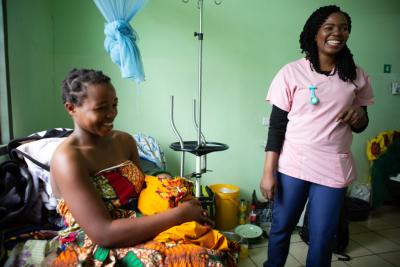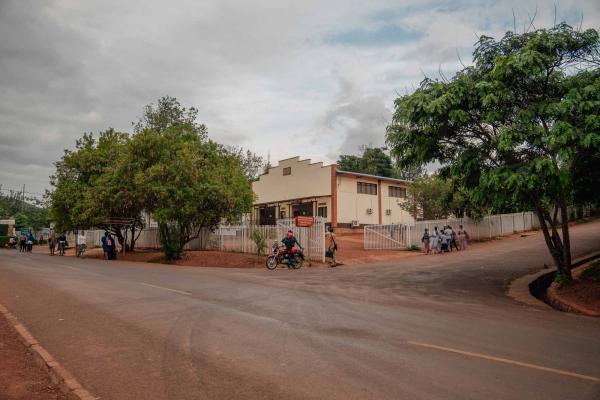“Can you tell us what you’re doing that is new or innovative?”
This is often the first question funders ask of global health or development organizations. It was an awkward question to ask global health or development organizations even before the Trump administration’s pernicious freeze on international assistance programs last week, endangering millions of lives. Now the question borders on cruelty.
The more innovative the work, the more deserving an organization is of increasingly scarce resources when far-away people are fortunate to be receiving any support in this political climate – or so the thinking goes.
Even putting aside the moral case, that thinking is wrong on multiple counts. The criteria for bringing quality health care to places so far deprived of this human right should be effectiveness, not novelty. Innovation is about new ideas and solutions that have a significant positive impact. Yet if something already exists on the other side of the river, in the capital city on the other side of the country, or on the other side of the world, it’s not new or innovative at all: It’s simply out of reach. There is nothing innovative about creating conditions for good things to happen in one place when those good things have been happening somewhere else for decades.
More to the point, neither innovation nor philanthropy – the latter nevertheless urgently needed in our current predicament – will ever be enough to address the fundamental outrage of 4.5 billion people lacking access to essential health care. Innovation as a philanthropic measuring stick conveniently glosses over centuries of injustices that led to under-resourcing essential inputs of a functioning health system across huge swaths of the globe.
Global south governments and activists know all too well that 3.3 billion people live in countries spending more on debt servicing than on education or health, their debt having been accumulated through a global financial system detrimental to their interests. Unfair global trade and tax practices cost these countries billions of dollars annually that could otherwise be used for public services. As an additional burden for being poor, African countries are forced to pay interest rates at least four times higher than public debt interest rates in Western countries.
Disappointingly, Canada was one of just nine countries to vote against UN global tax regime framework discussions that seek to put poorer countries on a more level playing field. The vote paralleled the colonial divide on TRIPS waiver intellectual property sharing discussions during the pandemic, except this time European Union countries decided to abstain rather than to block reforms – a tacit admission that change is needed. Parallel discussions taking place at the Organization for Economic Co-operation and Development (OECD) lack legitimacy because most countries, notably those that would benefit from reforms, do not have seats at the OECD table. Canada needs to do better. The fairness gap is far more damaging than an innovation gap could ever be.
In places where Partners In Health and like-minded organizations work, the most urgently needed “innovations” are access to effective and affordable health care, free primary and high school education, and a social safety net. For effective health care, we need what PIH calls the ‘five Ss’ – staff, stuff, space, systems that link them together, and social support. That’s what our patients are asking for. Writer, activist and PIH trustee John Green put it another way in a recent interview with Vox. If future generations look back at the current state of affairs, it will be our inattention to equity, not innovation, that will be the most shocking.
“I think people will be astonished,” Green said, “that there were places where health care systems were so robust that someone like my brother could get diagnosed with cancer and be in remission within six months and other places where somebody diagnosed with that same cancer would be dead within six months.”
There are countless examples of the good that can happen when we use aid investments wisely to build those systems. In rural Kono District in Sierra Leone, maternal deaths have fallen by roughly 80 percent since 2019 in a country that until recently had the world’s highest maternal mortality. The change is attributable to proven interventions, including activities supported by PIH Canada’s ‘No Woman or Girl Left Behind’ project with Canadian government and private funding, that strengthened the health system: providing well-trained and mentored doctors and nurses, facilities with electricity and running water, deep community engagement, referral systems for traditional birth attendants, and social supports for the most vulnerable patients.

Mary Samson rests with her newborn daughter Hannah at Neno District Hospital, Malawi, where she gave birth less than 24-hours prior.
Zack DeClerck / Partners In Health
Less than a decade ago in Dambe, Malawi, the health of the local population was transformed by a successful effort to eliminate health center user fees and through construction of a new health center built where the community said it was most needed. In settings of poverty, removing user fees brings improved health (and no patient asks about innovation). Even the smallest health care user fees were an insurmountable financial barrier when families living in poverty already struggled to feed children and pay school costs. Once health access was no longer an issue, people came in droves. In a few months, health care workers screened and treated more patients for HIV, TB, malaria, malnutrition, and hypertension than they had in years. For some patients, it was their first time ever seeing a nurse or a physician.
The positive net result of that tradeoff – user fees and few patients, or no fees and patients lining up out the door – is irrefutable. When people are healthy, economies benefit. When children have healthy mothers, their life outcomes improve. Everyone wins. We need more of it.
Nearly all groups make claim to innovative programming, and of course investments in successful aid and innovation platforms should continue. But in tandem, let’s acknowledge that aid and innovation alone, even when responsive to local needs and priorities, cannot bring about structural changes that provide global south countries with sufficient revenue to build resilient health and education systems.
U.S. isolationism leaves a gaping hole in global health infrastructure. Canada has to be one of many countries that step up to fill the gap. A stronger appreciation of on-the-ground realities and commitment to system-level reforms from our development, philanthropic, and foreign policy ecosystems would be a step in the right direction.
